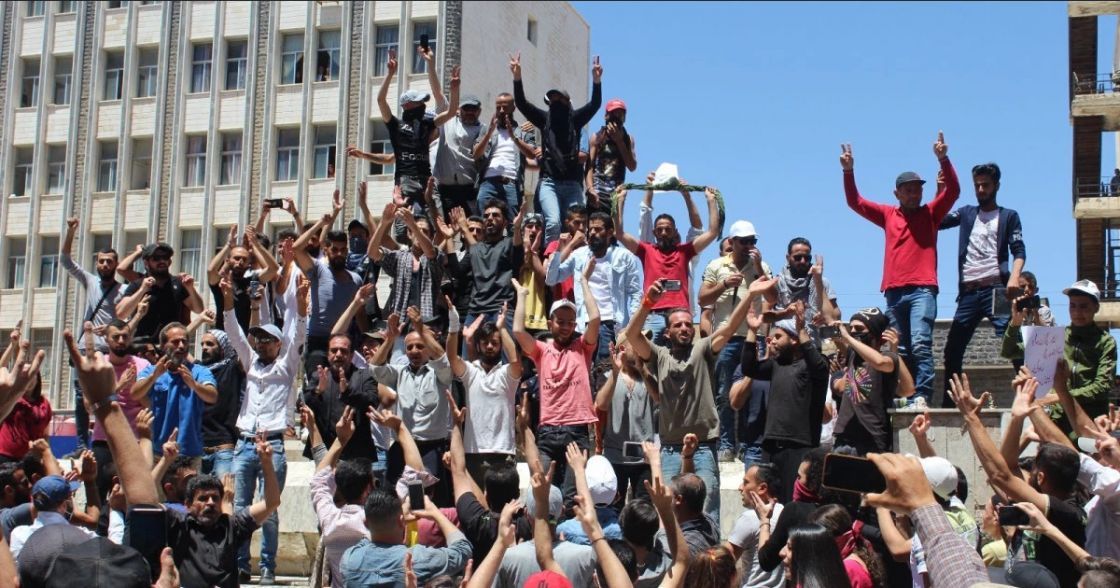- Editorials
- Posted
Kassioun Editorial 1057: Interpreting 2254, Part 3: Entry Point of the Solution
We continue what we started in Kassioun issues 1053 and 1055 editorials, which had the same main title and the following two subtitles, respectively: Part 1: Two Mentalities, and Part 2: Ruling Forces in the Regime and Opposition.
The recent Suwayda protests confirm that the reasons necessitating a radical and comprehensive change have not changed one bit, are still present, and have become even more urgent and necessary than ever.
Despite all criticisms of the movement currently taking place in Suwayda and its limitations – among the criticisms some rightful ones seeking to protect and develop the movement, and some slandering the movement seeking to justify annihilating it or taking it in directions hostile to the interests of the movement itself – it is to the emerging movement’s credit is its open insistence to search for a comprehensive national discourse and its adherence to peacefulness. It is also remarkable that the protesters held up the slogan of implementing UNSC Resolution 2254.
Perhaps what is more important is that what is happening in Suwayda is an indication not of Suwayda’s situation alone, but of the situation in all of Syria, whose people are greatly suffering from the continued obstruction of the political solution, and the continuation and intensification of plundering in the various sectors. They are also suffering from the deepening of the savage neoliberal policies, which are fully biased to the plundering “elites” and against the interests of all Syrians.
Since the beginning of 2011, we have said that there are three sides to the national dialogue leading to a solution: the regime, the opposition, and the popular movement. This statement is still essentially accurate. In this sense, starting to implement UNSC Resolution 2254, which provides for dialogue and consensus between the regime and the opposition, will be the entry point towards a comprehensive process that cannot be completed if the visible and latent popular movement does not find its way to represent itself and its interests in the political process.
Today, the clear problem in entering the implementation of the resolution is that it needs two sides that are qualified for dialogue and consensus, and believe that there is no way out except by consensus, not by a military victory or by toppling, and without any external interference. Of course, however, there could be and must be benefitting from the outside where possible and when the necessity arises, to help the Syrians themselves to reach consensus.
As for the opposition side, it is clear that this is not available in the presence of “ruling forces” that practice the same mentality as the “leading party” and are neither in a hurry nor interested in bringing the country to a solution. This undoubtedly satisfies and helps the extremists of the other side and expands the margins within which they can move.
Therefore, the mandatory entry point to the solution has become linked to restructuring the opposition so that voices and sides hostile to the political solution are not allowed to dominate within it. This restructure should be so that the structure is founded on inclusion, non-exclusion or monopolization, and in a manner that allows the formation of a qualified delegation to conduct the negotiation process, of which the Constitutional Committee will then become one of its pieces.
Starting real negotiations means creating an active internal dynamic that deepens the sorting out and improves the internal alignment, as well as deepening it regionally and internationally with regard to the Syrian situation, such that the weight of rational, patriotic, and democratic voices that seek salvation for the country and the people will rise.
Going to the beginning, protecting the popular movement from within it through its adherence to peacefulness and a comprehensive national discourse, as well as protecting it from outside by providing the conditions for its representation, and precisely by starting real negotiation leading to the implementation of 2254, is an essential tool for taking the implementation of the resolution to its desired ends, and for transforming its implementation into a platform that is not only to stop the collapse, but also to bring about a comprehensive and radical change in a Syria whose land and people are unified.


